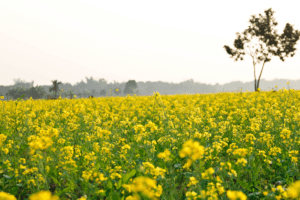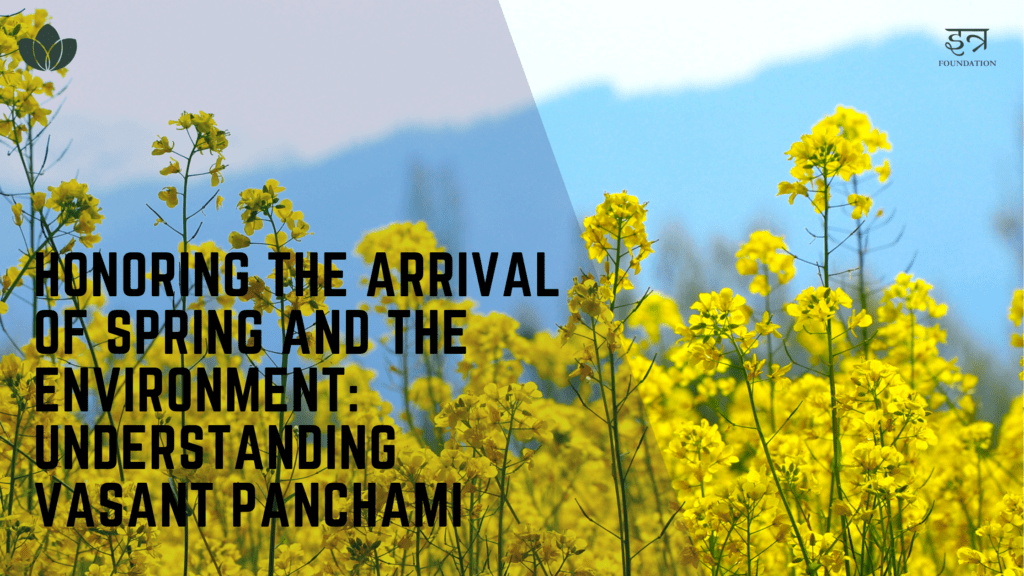Vasant Panchami is a Hindu festival that marks the beginning of spring and is celebrated on the fifth day of the Hindu month of Magha, usually in January or February. It is a festival of love, joy and devotion and is dedicated to the worship of the Hindu deity, Goddess Saraswati, who is the goddess of knowledge, wisdom and the arts.
Vasant Panchami is considered as one of the most auspicious days in the Hindu calendar and is believed to bring prosperity, success, and good fortune. The festival is celebrated with great enthusiasm and devotion, particularly by students and scholars, as it is believed that Goddess Saraswati blesses them with knowledge and wisdom on this day. The connection between Vasant Panchami and nature: Vasant Panchami marks the beginning of spring, a time when nature awakens from its winter slumber. The festival is celebrated with the blooming of flowers, the chirping of birds and the arrival of the new season. This connection between Vasant Panchami and nature is an important aspect of the festival and it is believed that the festival is a celebration of the renewal and rejuvenation of nature. This festival is also a reminder of the importance of nature in Hinduism and the need to respect, protect and conserve the natural world.
The Importance of Nature in Hinduism


- Description of Hinduism’s view of nature: Hinduism holds a deep reverence for nature, viewing it as a manifestation of the divine. Nature is seen as an integral part of the spiritual realm and is believed to be imbued with sacred energy. Hinduism teaches that all living beings are connected and that the natural world is an extension of the divine. This view of nature is reflected in the many Hindu texts and teachings that emphasize the importance of living in harmony with nature. The ancient Hindu text, Bhagavad Gita, for example, states that the natural world is a manifestation of the divine and that the ultimate goal of life is to understand and connect with the divine essence that lies within all things.
- The role of nature in Hindu spiritual practices: Nature plays a central role in many Hindu spiritual practices. Many Hindu rituals involve offerings and prayers to the natural elements such as the sun, moon, rivers and mountains. These offerings are believed to help maintain the balance and harmony of nature. Many Hindu temples and shrines are also located in natural settings, such as on the banks of rivers or at the base of mountains, with the belief that such places are more conducive to spiritual growth. Additionally, many Hindu ascetics and yogis retreat to nature for meditation and spiritual practice. Nature is also believed to be a source of inspiration and guidance for spiritual development.
- Examples of Hindu deities associated with nature: Many Hindu deities are associated with nature, such as Lord Vishnu, who is often depicted as reclining on the coils of the serpent Ananta, which represents infinite nature. Lord Ganesha, the remover of obstacles, is also believed to be the ruler of the elements and is often invoked in rituals related to nature such as housewarming ceremonies and the construction of new buildings. Lord Shiva is also known as the Lord of the Mountain and is often depicted in nature, living in the Himalayas with his consort, Parvati. In addition, goddesses such as Durga and Kali are also associated with nature and are believed to possess the power of the earth and its elements. They are often depicted with weapons and ornaments made of natural elements such as leaves, flowers, and fruits and are believed to protect and preserve nature.
The Connection between Vasant Panchami and Nature


- Explanation of the rituals and customs associated with Vasant Panchami: On Vasant Panchami, Hindus perform special rituals and customs to pay homage to nature and the arrival of spring. These rituals include offering prayers and flowers to the gods and goddesses, particularly to Goddess Saraswati and decorating homes and temples with flowers and rangolis. It is also customary to wear yellow clothes and eat sweet dishes on this day. Many people visit temples dedicated to Goddess Saraswati, where they perform puja, offer flowers and sweets and seek blessings for knowledge and wisdom.
- The symbolism of nature in Vasant Panchami celebrations: The rituals and customs associated with Vasant Panchami are steeped in symbolism that reflects the connection between the festival and nature. Flowers, for example, are symbols of the beauty and fragility of nature and their offering to the gods and goddesses is a way of showing reverence and gratitude for nature’s bounties. The use of yellow clothes, which is believed to be the color of spring, is also a symbol of the arrival of the new season and the renewal of life. The use of sweet dishes also symbolizes the sweetness and abundance of the new season.
- The message of environmental conservation and sustainable living in Vasant Panchami: The festival of Vasant Panchami is not just a celebration of the arrival of spring, but also a reminder of the importance of environmental conservation and sustainable living. The festival encourages people to appreciate and respect nature, to live in harmony with the natural world and make conscious choices that support sustainable living. The festival’s message of environmental conservation and sustainable living is particularly relevant in today’s world where many people are beginning to realize the importance of protecting the planet for future generations. The festival serves as a reminder to be mindful of our actions and their impact on the environment and to work towards preserving the earth’s resources for future generations. It is an important opportunity to reflect on our relationship with nature and to make a commitment to living in harmony with the natural world.
The Significance of Vasant Panchami for Modern Hindus
- How contemporary Hindus can connect to the festival’s significance: Modern Hindus can connect to the festival’s significance by understanding the deep reverence for nature that is a core aspect of Hinduism. They can also connect to the festival’s significance by recognizing the importance of knowledge and wisdom, which are central to the celebration of Vasant Panchami. By meditating on the teachings of the Hindu scriptures and connecting with the divine essence that lies within all things, modern Hindus can deepen their understanding of the festival’s spiritual significance. They can also connect to the festival’s significance by recognizing the importance of living in harmony with nature and by making conscious choices that support sustainable living.
- Ways to incorporate the festival’s message of nature conservation in daily life: Contemporary Hindus can incorporate the festival’s message of nature conservation in their daily lives by making conscious choices that support sustainable living. This can include reducing their carbon footprint by using public transport or carpooling, choosing organic and locally-sourced produce and reducing their consumption of meat. They can also incorporate the festival’s message of nature conservation in their daily lives by practicing simple acts of environmental conservation, such as recycling, composting and conserving water. They can also take part in local or community-based clean-up drives, tree plantation drives and other activities that promote environmental conservation.
- Suggestions for participating in Vasant Panchami celebrations in a sustainable way: Contemporary Hindus can participate in Vasant Panchami celebrations in a sustainable way by using eco-friendly materials for decorations, such as paper flowers instead of real flowers and by avoiding the use of single-use plastics. They can also participate in Vasant Panchami celebrations in a sustainable way by choosing organic and locally-sourced produce for their sweet dishes, and by supporting sustainable and ethical fashion choices when purchasing new clothes for the festival. They can also participate in Vasant Panchami celebrations in a sustainable way by supporting local and community-based celebrations, rather than large-scale commercial events. They can also make conscious choices about energy consumption during the celebrations, by using LED lights and solar-powered decorations and minimizing the use of electricity during the celebrations.
In summary, in this post, we discussed the connection between Vasant Panchami and the importance of nature and the natural world in Hinduism. Vasant Panchami is a festival that celebrates the arrival of spring and is steeped in symbolism that reflects the connection between the festival and nature. The festival encourages people to appreciate and respect nature, live in harmony with the natural world and make conscious choices that support sustainable living. We also highlighted the significance of Vasant Panchami for modern Hindus and provided ways to incorporate the festival’s message of nature conservation into daily life, as well as suggestions for participating in Vasant Panchami celebrations in a sustainable way. We emphasized the importance of understanding and appreciating the connection between Vasant Panchami and nature in Hinduism and encouraged readers to incorporate the festival’s message of nature conservation and sustainable living in their daily lives.






